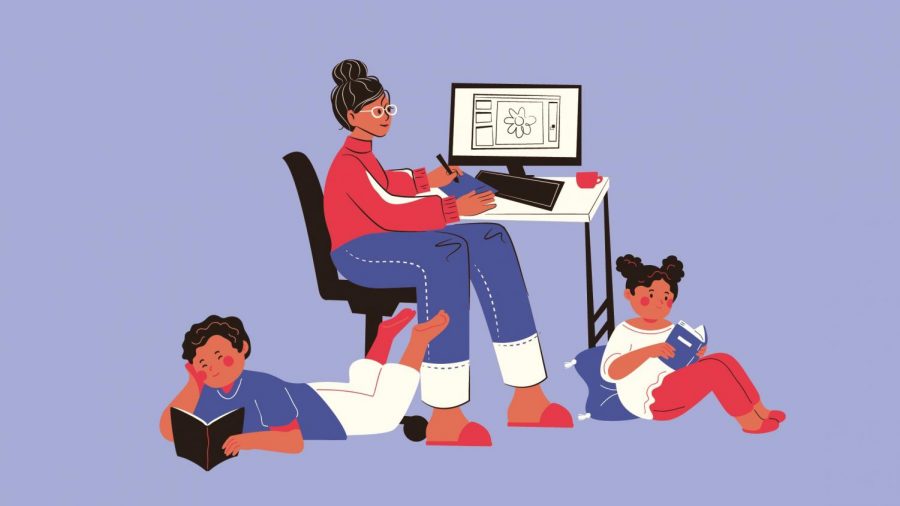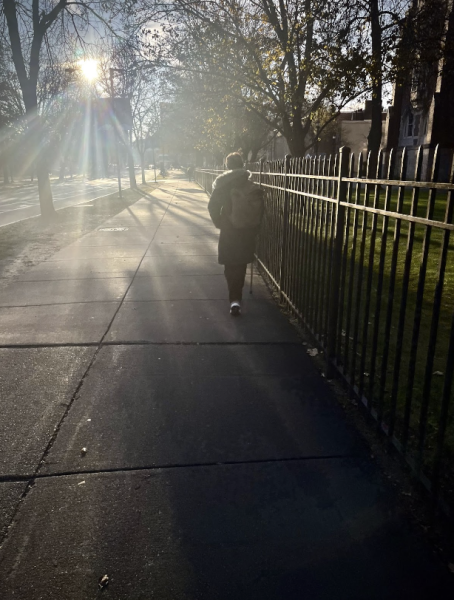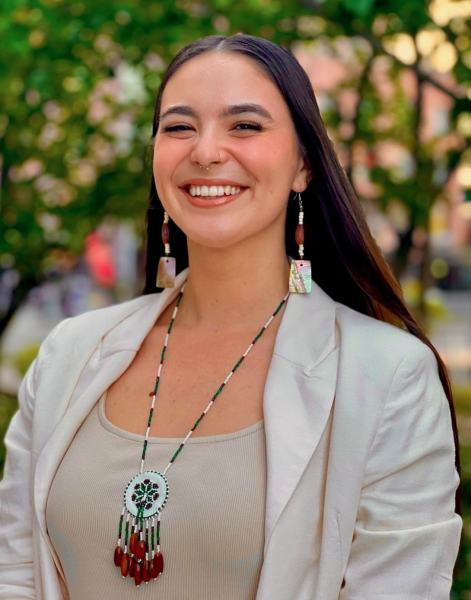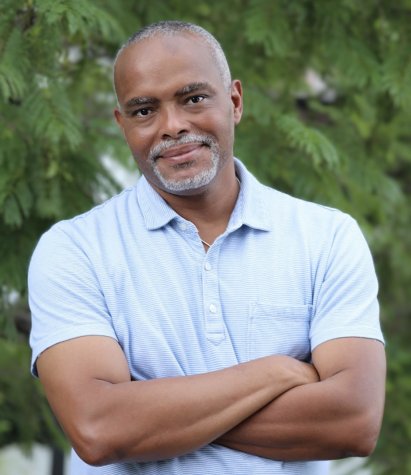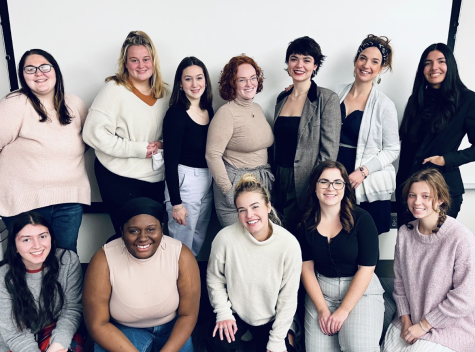Home for the semester: professor-parents at Simmons
“When I think about my role as a parent in all of this, you have to know your lane. I can be a really effective teacher and coach with someone else’s children. It is hard to learn from your parent. It is hard to teach your own child.”
December 2, 2020
This story was also featured on episode 9 of the Welcome Home podcast. Click here to listen.
Earlier in the semester, the Simmons community received word that all spring 2021 courses will be held online, a decision that has many members of the Simmons community wondering what another remote semester will look like for them. However, many professors know exactly what it will look like: more teaching and parenting from home.
The lives professors rely largely on the model of schooling their children are currently in. Lena Zuckerwise, a professor of political science and international relations, said that while the newly popular hybrid model is “disruptive” for working parents and their children, “we are grateful for any school.”
Her nine-year-old son goes to school half-days in a hybrid public school, and her four-year-old daughter attends a daily private preschool. Her son, who has a disability, is eligible for slightly more at-school time than his peers, but the abbreviated days have presented several challenges, both to his routine and to the lives of Professor Zuckerwise and her partner.
“My partner and I both work full time, and are lucky in the sense that our daughter is able to be in school in a way that approximates normal life,” Zuckerwise said. “But having to balance our two full-time work schedules, and also be able to give our kids what they need while they are at home remains challenging.”
She said that she feels that the wider societal sentiments surrounding these challenges have changed. She remembers a time last spring where the messaging from every corner seemed to be a resounding “whatever you can do is enough,” for those simultaneously working, schooling, and parenting. But while these messages have faded, the situations that initially called for them have not.
“Parents are still in a crisis. Not having full-time childcare is a crisis,” Zuckerwise said.
Not only have these professors been thrust into an all new teaching environment, many have also found themselves as a different kind of teacher. Kristina Pechulis, professor of political science and international relations, said that perhaps the biggest challenge in her life as an at-home professor-parent is that she is serving as a teacher to her elementary school aged children.
“My fourth grader is very independent, but my second grader, he needs a little bit more direction, and so I find that I spend much more time with him than I did previously, because he was at school,” said Pechulis. “Because I have young kids, I’m able to spend all this time with them that I wasn’t able to before, which is the one good thing about the pandemic.”
Zuckerwise echoed that sentiment, saying that despite the challenges, she has found some positives in her new normal.
“It is more work and more stress than I can even articulate, but being able to have that time with them when they were home all the time, and getting a sense of how they learn, how we can teach them effectively, and also how to stay in touch with their academics. This is particularly true for my son, and has been really eye opening and helpful,” she said.
Professors with older children are struggling as well. Rachel Gans-Boriskin, a communications professor, has had to reconsider her involvement with her children’s schooling.
“When I think about my role as a parent in all of this, you have to know your lane. I can be a really effective teacher and coach with someone else’s children. It is hard to learn from your parent. It is hard to teach your own child,” said Gans-Boriskin. “I’m lucky enough that the kids are older, but I think it’s all just hard. You don’t want your parent as your teacher.”
Kristina Markos is a communications professor and the mom of two boys; a 16-month-old and a five-year-old. She said she is finding joy in her work as a professor.
“I find that I am happy doing lesson plans or meeting my students on Zoom because for those moments, I’m not thinking about COVID or the election,” Markos wrote over email. “I’m keeping my eye on the prize of getting my students where they need to be, while also appreciating the small moments of normalcy that we find when we get together.”
Curricula have not only provided much needed moments of solace, but have also given professors new ideas about how to structure these same classes for a remote environment. Zuckerwise said teaching online has caused her to consider adapting her future in-person classes based on some successes she’s seen in the online environment. She said this is largely due to her experience as a mom to a child with a disability.
“I do think that there are aspects of remote learning that are very conducive to teaching to a diverse set of learners… and that the remote environment is conducive to delivering material in a variety of ways rather than just the one way in the classroom,” she said.
Gans-Boriskin said she’s satisfied with how her online classes have been going. Most of her in-class lecture time has been replaced by pre-recorded videos and asynchronous work. She stated that even when her classes are meeting in-person again, the videos will not be left behind.
“There are things pedagogically that have gone on this semester that I feel are really an improvement. I’ll probably keep some of those lectures in there when we go back on the ground. For a generation that learns from YouTube, this format has such a benefit,” she said.
All of these professors remarked about the unique ability of the Simmons community to weather these unprecedented times. Dr. Mike Welch, a professor of exercise science, expressed his gratitude toward the flexibility and patience that the Simmons community extends toward professor-parents.
“The Simmons community makes a point to show their support in various ways such as encouraging to complete work when conducive to family schedules, taking time for yourself for self care, and eager to share ideas/stories/etc on how to navigate various challenges that come up as so many of us have similar experiences,” wrote Welch in an emailed statement.
When asked about lessons learned and feelings felt looking down the barrel of another remote semester, professors seemed optimistic. Zuckerwise remarked at the bravery, flexibility, and resilience she’s seen in her students and colleagues through this difficult period.
“Simmons students and faculty are uniquely resilient and capable of making this work. We’ve been doing it, we’ll continue doing it, and there’s an end in sight. This isn’t going to last forever,” she said.



